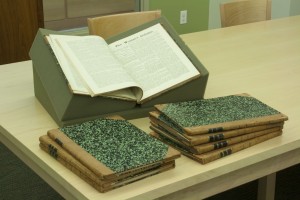
Karen Mason today. Photograph courtesy of Karen Mason
Kicking off our Women’s History Month Celebrations we have the entry from our alumnae winner of our annual essay competition. Kären M. Mason, ‘75 answered the essay’s prompt: Transformations: How has the Bryn Mawr College experience made me the person I am today?
Kären is Curator of the Iowa Women’s Archives, University of Iowa Libraries, a position she has held since the archives’ founding in 1992. She earned degrees in history from Bryn Mawr College, the University of Minnesota, and the University of Michigan, where her dissertation focused on US women’s history. Kären will be presenting at the Women’s History in the Digital World Conference here at Bryn Mawr College on March 23rd, make sure to register by visiting the conference website if you are interested in seeing Kären’s talk.
Read her winning response to our essay competition question now….

Karen Mason in her 1975 Yearbook Photo. Courtesy of Bryn Mawr College Special Collections
In the fall of 1970 I was a senior at a suburban Minneapolis high school, pondering my future. I clearly remember a phone conversation between my parents, myself, and my brother John, who was then a junior at Haverford College. My father asked John “Do you think Kären should apply to Bryn Mawr?” John hesitated before replying, “I guess so.” That ringing endorsement was good enough for my father, who encouraged me to add Bryn Mawr to the Midwestern liberal arts colleges on my list. I did apply to Bryn Mawr, but that spring I sent my $100 deposit to Carleton College in Northfield, Minnesota, fully intending to matriculate there. No doubt it was my father who urged me to visit Bryn Mawr after learning I’d been accepted there.
When my mother and I arrived at Bryn Mawr on a sunny spring day, the campus was in bloom. The sunlight and flowering trees showed off the gothic architecture in the best possible light. We were smitten. I recall no campus tour, only a meeting with admissions director Elizabeth Vermey, who was warm and kind and made me feel very welcome. I must have visited a dorm, though, because the appeal of a suite or single room over the one-room triple I’d been shown at Carleton made an impression. But to be honest, it was a dinner at the Haverford dining hall with my brother and his handsome and charming friends that sealed the deal. To summarize: blossoms, admissions officer, single room, Haverford. So, like many high school seniors, my decision was based on a gut feeling, not on a rational weighing of pros and cons or academic programs. I opted for Bryn Mawr despite its being a women’s college, not because it was a women’s college. I would not have gone to Bryn Mawr if not for the robust bi-college community.
That said, I loved college. I made good friends and socialized and had excellent professors. I lived in a palatial suite in Denbigh my freshman year with my first single bedroom ever and a lovely view of New Gulph Road and the outside world. There were teas given by upperclassmen and serendipitous gatherings in the “smoker” (an unfortunate term for the lounge in a building with a 90-second fire life, but perhaps not as anachronistic as calling the lovely woman who watched over us a “warden”). Some of my favorite memories are trips to Zonkers for music, incense, and other necessities for a seventies dorm room; the Paoli local; the walk to Haverford, especially the last part through the woods; the College Inn; occasional meals at Hot Shoppes and Roy Rogers; Frisbee and flag football on the Merion green; and seeing Bonnie Raitt, Arlo Guthrie, and Taj Mahal at the Main Point, and the Grateful Dead and Traffic at the Spectrum. Some of my least favorite memories are Hell Week and the dogfish I dissected for weeks upon end until all that remained was the smell of formaldehyde. Academically, I especially liked the anthropology courses I took, and felt a real sense of accomplishment when I completed my six-week paper on “Fate in the Novels of Thomas Hardy” for Freshman English.
But Bryn Mawr College was a culture shock. I referred to myself as “the Minnesota quota.” Although I had been at the top of my class at an excellent public high school, I felt totally unprepared for the rigors of Bryn Mawr academics. Comparing myself to the prep school graduates in my French class who had spent vacations abroad and were already fluent, I soon jettisoned my plan to be a French major. I floundered until taking a US history course with Roger Lane at Haverford my sophomore year, the semester I had to declare a major. When Professor Lane passed out the budget of an immigrant family to give us a window into turn-of-the-century working class life, I discovered that history was not just about war, politics, and great white men, but about all people. I took history courses on both campuses, and benefitted from the breadth of options thus provided. Majoring in history changed my life and set me on a path that ultimately led to my becoming an archivist.
Nonetheless, by my junior year I had become ambivalent about Bryn Mawr, a feeling that never left me. I later framed my college years as a time when I explored the East Coast, visiting my brother Chris at Johns Hopkins and spending holidays in New York City, Boston, and elsewhere with Bryn Mawr friends, but deciding I was a Midwesterner at heart. I often said that Bryn Mawr had taught me how to write but that Haverford did a better job of teaching students how to think critically. I received an excellent education and I know that my Bryn Mawr degree opened doors for me.
So why the ambivalence? In part, it was that seventies “question authority” attitude toward institutions of any kind. And partly it was my Midwestern anti-elitist bent. But recently when preparing to be interviewed for a University of Iowa television program, I spent some time reflecting on my experience at Bryn Mawr. More and more I realized how important the college’s feminist underpinnings had been to me. I didn’t realize the extent to which Bryn Mawr had inculcated feminist values in its students as we learned about M. Carey Thomas and the history of the college. We scoffed at the oft-repeated phrase “our failures only marry.” And we snickered at the Maypole tradition and the Paoli local mnemonic “old maids never wed and have babies.” What not-so-subtle and oh-so-contradictory messages were we receiving? And yet feminism was a given at Bryn Mawr. My friend Marianne, who was a year ahead of me, loaned me Betty Friedan’s The Feminine Mystique and Robin Morgan’s Sisterhood is Powerful to read over the summer after freshman year. And that is when the pieces fell into place. I began calling myself a feminist after reading those books, but my freshman year at Bryn Mawr had prepared the way and the remaining years cemented my feminism. Bryn Mawr brought me into contact with smart, feminist women—students and professors and guest lecturers—and nurtured my feminism in ways I didn’t recognize at the time or for many years later.
I stumbled into the archival profession, as most archivists do. Straight out of college, there were no jobs in museums, the career I had imagined for myself as a history major. After a stint doing secretarial work, I was interviewed for a job as an editor for the path breaking Women’s History Sources Survey at the University of Minnesota in the late 1970s. I am sure I landed the interview because I was a Bryn Mawr graduate, since I had absolutely no experience or qualifications to be an editor. But that interview led to a volunteer position, and soon thereafter a paid position, working on the survey. It was through this job that I discovered an affinity for archives and women’s history. I went on to earn a PhD in history, writing my dissertation on an extraordinary group of women in Progressive-Era Chicago and cutting my teeth as an archivist at the University of Michigan.
In 1992 I was hired by the University of Iowa as the first curator of the newly-established Iowa Women’s Archives. For the past twenty years I have nurtured the archives, building the collections, teaching students about the treasures therein, assisting scholars, mentoring future archivists. It is a rewarding job. In this position I meet women of diverse backgrounds and experiences from all walks of life and persuade them to donate their personal papers—letters, photographs, diaries, scrapbooks—to the Iowa Women’s Archives. In so doing, I am saying to each woman that her life has been important, that others can learn from her experiences, that history is about everyone, not just the rich and powerful, and not just about men. As I ask women about their lives, I find that the backstory is often just as significant as the activities by which they define themselves to the larger world. I try to draw out these backstories and ascertain what documents might illuminate them. The results are gratifying: rich collections for the archives, and for the women who contribute their papers, a sense that their lives have mattered.
Reflecting on my own life in the way that I ask donors to reflect on their lives, I see that I have a backstory, too, and that Bryn Mawr College is a large part of that backstory. It’s not just a line on my resumé. What I learned at Bryn Mawr—outside as well as inside the classroom—is deeply embedded in me. The job I have today weaves together my feminism, my love of history, and my curiosity about the human experience, passions that arose from my experiences and studies at Bryn Mawr. A feminist grounding, together with a superior education and rigorous academic requirements, provided me with the foundation that helped me succeed in a wonderful career that I never imagined while at Bryn Mawr.
For editorial policies on guest blogs please see http://greenfield.blogs.brynmawr.edu/sample-page/









